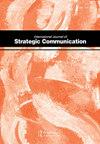The Effects of Dangerous World Beliefs on COVID-19 Preventive Behaviors in Singapore: The Moderating Role of Public Health Communication
IF 1.9
Q1 COMMUNICATION
International Journal of Strategic Communication
Pub Date : 2022-05-27
DOI:10.1080/1553118X.2022.2036742
引用次数: 2
Abstract
ABSTRACT This research purposes to examine the role of strategic communication, specifically the effectiveness of government's crisis communication messages at the onset of COVID-19 pandemic in Singapore, on disease preventive behaviors. It employed a mixed method research approach by first carrying out a content analysis of 7128 news headlines on COVID-19 to confirm our presupposition that the media may be communicating messages that the world order is being threatened. Informed by our findings that 90% of news reports were framed to suggest a dangerous world, we surveyed 453 respondents in the main study, and tested if people's beliefs in a dangerous world (BDW) were linked to their disease preventive behaviors (DPB), and whether such a link was modulated by how effective they perceived the government's pandemic communication. As predicted, results revealed that the perceived effectiveness of the government's pandemic communication trumped the effects of beliefs in a dangerous world such that the link between BDW and DPB was significant only when the perceived effectiveness was low. Further analysis of the effects of specific communication dimensions on disease preventive behaviors suggests that public health communication needs to be strategically calibrated to offer personally relevant messages that are informative and objective. (199 words)危险的世界信仰对新加坡新冠肺炎预防行为的影响:公共卫生传播的调节作用
摘要本研究旨在检验战略沟通的作用,特别是新冠肺炎疫情爆发时新加坡政府危机沟通信息对疾病预防行为的有效性。它采用了一种混合方法研究方法,首先对7128条关于新冠肺炎的新闻标题进行了内容分析,以证实我们的假设,即媒体可能正在传播世界秩序受到威胁的信息。根据我们的发现,90%的新闻报道都被认为是一个危险的世界,我们在主要研究中调查了453名受访者,并测试了人们对危险世界的信念(BDW)是否与他们的疾病预防行为(DPB)有关,以及这种联系是否受到他们对政府疫情沟通有效性的影响。正如预测的那样,结果显示,在一个危险的世界里,政府疫情沟通的感知有效性超过了信念的影响,因此只有当感知有效性较低时,BDW和DPB之间的联系才是显著的。对特定沟通维度对疾病预防行为影响的进一步分析表明,公共卫生沟通需要进行战略校准,以提供信息性和客观性的个人相关信息。(199字)
本文章由计算机程序翻译,如有差异,请以英文原文为准。
求助全文
约1分钟内获得全文
求助全文
来源期刊

International Journal of Strategic Communication
Social Sciences-Sociology and Political Science
CiteScore
3.40
自引率
0.00%
发文量
39
期刊介绍:
The International Journal of Strategic Communication examines the philosophical, theoretical, and applied nature of strategic communication, which is “the purposeful use of communication by an organization to fulfill its mission.” IJSC provides a foundation for the study of strategic communication from diverse disciplines, including corporate and managerial communication, organizational communication, public relations, marketing communication, advertising, political and health communication, social marketing, international relations, public diplomacy, and other specialized communication areas. The IJSC is the singular forum for multidisciplinary inquiry of this nature.
 求助内容:
求助内容: 应助结果提醒方式:
应助结果提醒方式:


